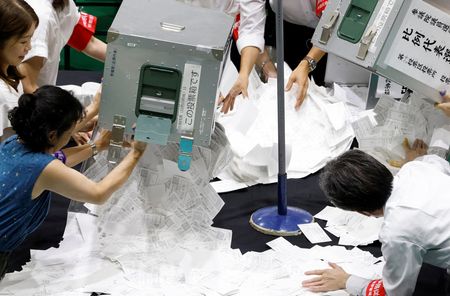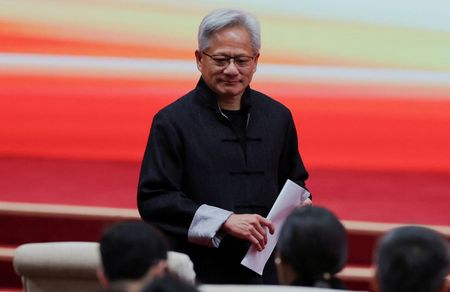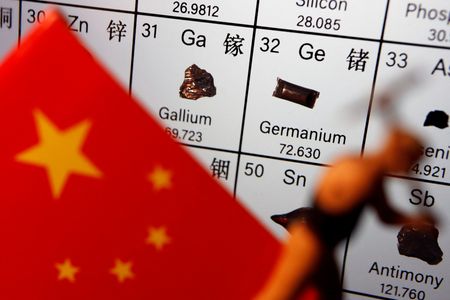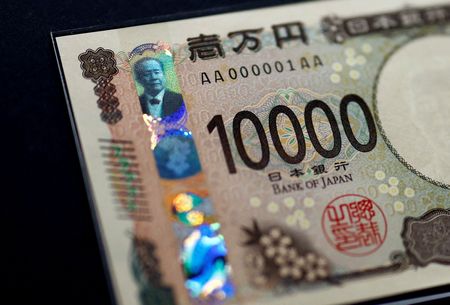SINGAPORE (Reuters) -Japan’s ruling coalition lost control of the upper house in an election on Sunday, further weakening Prime Minister Shigeru Ishiba’s grip on power even as he vowed to remain party leader, citing a looming tariff deadline with the United States.
Markets in Japan were closed for a holiday on Monday, but the yen strengthened while Nikkei futures rose slightly, as the election results appeared to be already priced in.
While the ballot does not directly determine whether Ishiba’s administration will fall, it heaps pressure on the embattled leader and could imply either policy paralysis or a bigger fiscal deficit depending on what the ruling party does next and how strong the opposition becomes.
QUOTES:
MICHAEL WAN, SENIOR CURRENCY ANALYST, MUFG, SINGAPORE:
“The big thing is whether… there’s any potential change in the prime minister, and with that, any further increase in political uncertainty.”
“With some of the proposals at the margin, with the changed political dynamics, potentially you could see more clamour for fiscal support including consumption taxes.
“However, I do think that there are probably a few things that are also a little bit different… I think two key differences is that one, in the current dynamics, actually Japan’s public debt-to-GDP ratio, while high, is expected to come down because of high nominal GDP growth, so I think that’s quite important.
“The second is that… relative to other countries, Japan is a net creditor. So you do have, in theory, a lot of funds on the sidelines, from domestic institutions who have invested abroad, which could cap any sharp and dislocation in yield spikes over the medium term.”
NORIHIRO YAMAGUCHI, LEAD JAPAN ECONOMIST, OXFORD ECONOMICS, TOKYO:
“The political situation has become fluid and could lead to a leadership change or the reshuffling of the coalition in coming months, but Prime Minister Shigeru Ishiba will likely stay to complete the tariff negotiations with the U.S. for now.
“After losing majorities in both the lower and upper houses, the Ishiba administration will find it more difficult to pass legislation and will need support from opposition parties on a case-by-case basis. Fiscal concerns will continue to be a major topic in the JGB market.”
TOM NAKAMURA, VICE-PRESIDENT AND HEAD OF FIXED INCOME AND CURRENCIES, AGF INVESTMENTS, CANADA:
“The results look to be broadly in-line with market expectations and may not cause a significant move in markets. With LDP/Komei falling short, eyes will be on potential coalition partners to form a government. This may force the government to implement some easing fiscal measures, possibly a reduction of the consumption tax. This would cement fiscal concerns that have built up in higher long-end JGB yields.
“For yen, the story is mixed and more of the focus may be on tariff negotiations. With PM Ishiba vowing to stay on as leader, the negotiations will maintain continuity, but this also dashes the hopes for a fresh start in talks with the U.S. which have not been very fruitful thus far.”
CARLOS CASANOVA, ASIA SENIOR ECONOMIST, UBP, HONG KONG:
“Ishiba said that he intends to stay on… however, whenever there’s an election defeat, within two months, the prime minister steps down, so what investors are going to be looking for next is whether or not he indeed is able to stay on, or whether we will face another change in leadership.”
MAGDALENE TEO, HEAD OF FIXED INCOME RESEARCH ASIA, JULIUS BAER, SINGAPORE
“Uncertainty has increased regarding the prime minister’s leadership and whether he will remain in office. Should he stay, it is anticipated that Japanese government bond yields will remain elevated and continue to rise, whilst the yield curve steepens, as the government may be compelled to pursue an unsustainable debt path in order to implement its policies.
“Furthermore, the prime minister is unlikely to be in a strong position to navigate the complex trade negotiations with the United States at this pivotal moment in the bilateral relationship between the two countries, particularly as Japan’s economic growth slows.”
RAY ATTRILL, HEAD OF FX RESEARCH, NATIONAL AUSTRALIA BANK, SYDNEY:
“Most people would’ve thought there might be a knee-jerk negative yen reaction, but we have seen a reasonable degree of yen underperformance in the lead up to Sunday, so to some extent, I think there’s a kind of ‘we bought the rumour, sold the fact’.
“The big thing this week is more Japan’s chief trade negotiator trying to get a deal over the line, that is something other than the 25%, and to the extent that the election result weakens Japan’s negotiating position – because you haven’t got a coherent, united government, at the margin, I think that militates against the likelihood of anything happening that gets us back to anywhere close to a sort of 10% baseline tariff come August 1.”
SHOKI OMORI, CHIEF DESK STRATEGIST, MIZUHO SECURITIES, TOKYO (IN A NOTE):
“Prime Minister Shigeru Ishiba has so far offered no hint that he will resign, and the measured confidence of his post-election remarks suggests that he intends to remain in office.
“Many back-bench LDP legislators – wary of plunging into a leadership contest while bilateral tariff talks with Washington are unfinished and party approval ratings remain depressed – appear disinclined to ‘reach for the chestnut in the fire’ by forcing an early succession battle.
“Against that political backdrop, prospects for an aggressive fiscal stimulus are limited. Ishiba has shown no appetite for revenue-hungry measures such as a temporary reduction of the consumption tax rate, and even a leadership change would be unlikely to accelerate the launch of a large-scale package.
“A meaningful supplementary budget, if one emerges, would not be debated until the autumn Diet session at the earliest. The only proposal now circulating within the coalition – a modest, one-off cash transfer to households – would entail little additional financing, and therefore little immediate impact on government borrowing.”
(Reporting by Asia markets team; Editing by Chizu Nomiyama, Nia Williams, Muralikumar Anantharaman and Shri Navaratnam)











